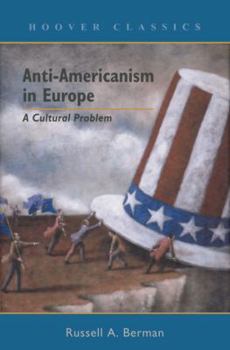Anti-Americanism in Europe: A Cultural Problem Volume 527
Select Format
Select Condition 
Book Overview
Since September 11, 2001, the attitudes of Europeans toward the United States have grown increasingly more negative. For many in Europe, the terrorist attack on New York City was seen as evidence of how American behavior elicits hostility--and how it would be up to Americans to repent and change their ways. Yet, as this book argues, the deep cultural roots of European anti-Americanism predate contemporary partisan concerns. In this revealing look...
Format:Hardcover
Language:English
ISBN:0817945113
ISBN13:9780817945114
Release Date:February 2008
Publisher:Hoover Institution Press
Length:128 Pages
Weight:0.60 lbs.
Dimensions:0.8" x 4.8" x 7.2"
Customer Reviews
3 ratings
A Superb Work
Published by Thriftbooks.com User , 16 years ago
Simply stated: This book should be read my every student of U.S.- European relations as Professor Berman hits the nail on the head.
Very good book on European anti-Americanism
Published by Thriftbooks.com User , 18 years ago
In the immediate aftermath of the 9/11 attacks on the United States, Europe, like much of the rest of the world, offered its sympathy. However, as time passed, the European attitude towards the U.S. hardened, and grew increasingly negative. In this fascinating book, Professor Russell A. Berman, senior fellow at the Hoover Institute, examines the anti-Americanism that has come to the fore since September 11th, 2001. European anti-Americanism is not a mere result of certain American policies, but has deep roots in European culture and ideology. In these five fascinating essays, Dr. Berman examines where this anti-American attitude comes from, and just how deep the divide between the two sides of the Atlantic Ocean is. Overall, I found this to be an absolutely fascinating book. The author goes a long way towards proving his thesis that European anti-Americanism is not a reaction to specific American policies or actions, but forms an argument-proof prejudice that runs deep, and is getting deeper. Now, my one complaint is that the author does not provide any suggestions for what course the United States government should take in dealing with this way of thinking. I would have found that definitely worth reading. But, that said, I do think that this is a great book. If you are interested in really understanding European anti-Americanism, then this is a very good book to read. [If there is one book that I would recommend even more, it would be Anti-Americanism by Jean-Francois Revel, a truly excellent book.]
Compelling But Ponderously Heavy
Published by Thriftbooks.com User , 20 years ago
This book is essential to understanding the hostility to America rooted deep in European, and especially German, culture. The book places anti-Americanism in historical context in five separate free-standing, yet mutually supporting essays. The book is difficult reading given the number of references to obscure writers, philosophers, and activists who are little known outside extremist European political circles. Each chapter deals with some different aspect of anti-Americanism, and chapter five also discusses the parallels between anti-American and anti-globalization rhetoric in Europe. The best chapter is chapter three, "Democratic War, Repressive Peace" in which Berman discusses the fundamental logical problems and lack of factual basis supplied by leaders of the anti-American movement, or as the author succinctly states in the first page of the chapter: "Drawing on long-standing cultural conditions rather than on contemporary conditions, anti-Americanism is trapped in a world of imagination. It is ideological in the sense that the ideals to which it adheres are never tested against hard facts." Numerous examples are cited to prove his assertion, and the chapter is probably the single most concise indictment of the hypocrisy present in the anti-American movement in Europe that I have yet seen. The book lost a star for chapter five (on anti-globalization), which becomes a tangent to the book more that a topical discourse on anti-Americanism per se. He also spends quite a bit of time on the writings and political views of Arundhati Roy, a bombastic Indian anti-American propagandist. Although she is read more in Europe than in the US, her influence seems blown out of all proportion to her actual relevance, which is essentially nil. This is a good and noble effort, although I think that "Anti-Americanism" by Jean Francois Revel is a better overall book, and is certainly more readable.






